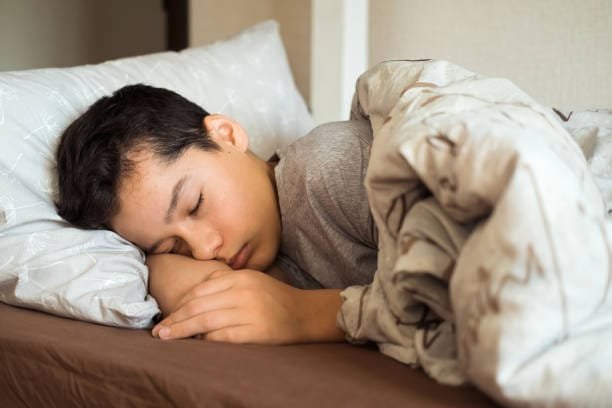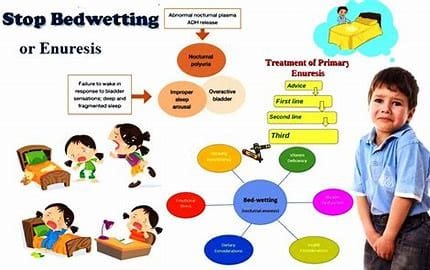Table of Contents
Introduction

Enuresis disease in children, commonly referred to as bed-wetting, is the unintentional release of urine during sleep. This condition predominantly affects children but can also persist into adulthood. In this article, we’ll explore enuresis disease in children, its causes, types, treatment options, and practical advice on how to stop bed-wetting in adults.
1. What is Enuresis Disease?
Enuresis disease is classified as nocturnal enuresis when it occurs at night and diurnal enuresis when wetting takes place during the day. Nocturnal enuresis disease is more prevalent and typically occurs in children aged 5 years and above.
Even though most children outgrow the enuresis disease as their bladder matures, it is a source of concern among families when it persists beyond usual developmental stages. Adults also suffer from bedwetting due to underlying health conditions or psychological factors.
2. Categories of Enuresis Disease
There exist two kinds of enuresis disease: one primary, and the other secondary. This is so because.
Primary Enuresis: A condition where a child has never gained complete bladder control during sleep.
Secondary Enuresis: This develops after a child or adult has attained bladder control for at least six months and then bed-wetter’s again.
3. Causes of Enuresis Disease among Children
Enuresis disease among children may come about due to several factors.
The bladder develops slowly in some children, which affects their ability to hold urine.
Hormonal imbalance: Low levels of antidiuretic hormone increase the production of urine at night.
Genetics: An inherited family history of bedwetting. A family history of someone who suffers from this problem increases the chances of it happening to a child.
Deep sleeping patterns: Some children are heavy sleepers and do not wake up to the sensation of the bladder being full.
Emotional or psychological stress: Changes like relocation, school start, or family problems can cause bed-wetting.
Underlying medical issues: UTI infection, diabetes, or constipation are a few examples of underlying issues that can lead to enuresis disease.
4. How to Stop Adult Bed Wetting
Adult bedwetter suffers from shame and agony. However, there is hoped to manage and treat this condition effectively.
Identify cause: For adults, the condition of bed-wetting may be associated with sleep apnea, bladder dysfunction, diabetes, or neurological disorder. He or she should visit a healthcare provider for a diagnosis.
Lifestyle modification: Reducing fluid intake before bedtime, eliminating consumption of caffeine and alcohol, and urinating prior to going to sleep may reduce the risk of bedwetting.
Bladder training: Strengthening the bladder’s capacity gradually by increasing intervals during the daytime might be beneficial.
Medications: Drugs such as desmopressin can be prescribed to decrease urine production or may include anticholinergics for the treatment of muscles in the bladder.
Use of alarms: Bedwetting alarms can wake individuals when they initiate urination, enabling them to master control gradually over time.
5. Treatment Solutions for Enuresis Disease

If you or your child suffers from enuresis disease, you have a range of options available for treatment:
Behavioral strategies:
Reward systems: Praise dry nights by providing small rewards for progress.
Positive reinforcement: Do not punish accidents and praise any successes.
a. Bladder training:
Have your child pee/poo regularly during the day. But gradually keep increasing the period between bathroom visits to actually strengthen the bladder.
b. Bed-wetting alarms:
These devices are moisture-sensitive and trigger a sound or vibration when moisture is detected.
Consistency over weeks or months makes quite a big difference in bladder control.
c. Medications:
Desmopressin (DDAVP): A synthetic hormone that reduces urine production during the night.
Anticholinergics: tend to relax the bladder while also reducing spasms.
Medications should be prescribed and monitored by a doctor.
d. Therapy and counseling:
Treatment of emotional or psychological contributing factors may be successful, especially in children who suffer from secondary enuresis.
e. Dietary changes:
refrain from foods and liquids that also have irritating effects on the bladder, including citrus, chocolate, and carbonated beverages.
6. FAQ’s About Enuresis Disease
How old should one be concerned about a child wetting his bed?
Occasional bedwetting is not unusual in children under the age of 5. However, if it persists beyond age 7 or if there are signs of secondary enuresis, see a pediatrician.
Is nocturnal enuresis disease genetic?
Yes, genetics play a pretty big role. If either or both parents had bed-wetting issues when they were children, their child is much more likely to have it.
Can bed-wetting in adults be cured?
Yes, more often than not. Determining the cause can help design an effective treatment plan; this may include medication and behavioral changes.
How effective are bed-wetting alarms?
A bed-wetting alarm has about a 70% to 80% success rate for individuals who consistently use it appropriately.
Is bed-wetting an indication of a serious medical problem?
No.
Not necessarily. Although enuresis disease is benign, repeated or sudden episodes of bedwetting can sometimes indicate an underlying condition: UTI or diabetes, for example.
7. Last Thoughts

Enuresis disease may be problematic to handle, especially in children and adults, but this disease is possible to treat given the right approach. Understanding causes and exploring treatment options helps families encourage children to overcome this problem. In adults, people can consult their physicians or make lifestyle changes that reduce the risk of bedwetting.
If you or your child struggles with nocturnal enuresis disease, remember that support, patience, and consistent treatment strategies can make a significant difference. Always consult a healthcare professional for personalized advice and solutions.



